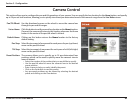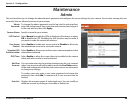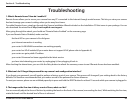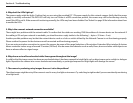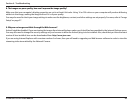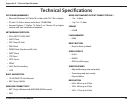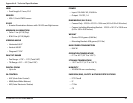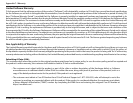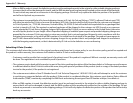
44D-Link DCS-5010L User Manual
Section 4 - Troubleshooting
4. Why don’t the LEDs light up?
The power supply might be faulty. Conrm that you are using the provided DC 12V power supply for this network camera. Verify that the power
supply is correctly connected. The WPS LED will only turn on if there is a WPS connection present, the camera may still be functioning correctly
even if this LED is not lit. If the camera is functioning normally, the LEDs may have been disabled. See “Admin” on page 38 for information about how
to enable the LEDs.
5. Why is the camera’s network connection unreliable?
There might be a problem with the network cable. To conrm that the cables are working, PING the address of a known device on the network. If
the cabling is OK and your network is reachable, you should receive a reply similar to the following (…bytes = 32 time = 2 ms).
Another possible problem may be that the network device such as a hub or switch utilized by the Network Camera is not functioning properly.
Please conrm the power for the devices are well connected and functioning properly.
If you are using a wireless connection to connect the camera, be aware of the range limitations of the wireless N standard. Most wireless N devices
have a maximum indoor range of around 70 metres (230 feet). Also be aware that obstacles such as walls, oors, doors and other solid objects can
have an adverse eect on signal range.
6. Why does a series of broad vertical white lines appear throughout the image?
It could be that the image sensor has become overloaded when it has been exposed to bright light such as direct exposure to sunlight or halogen
lights. Reposition the camera into a more shaded area immediately, as prolonged exposure to bright lights will damage the sensor.
7. The camera is producing noisy images. How can I solve the problem?
The video images might be noisy if the camera is used in a very low light environment. Try switching to night mode if you are consistently monitoring
a low light area.




